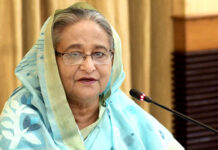
Human Rights Watch today urged the Bangladesh government to immediatelyrevoke a new media policy that imposes draconian restrictions on media freedom.
Donors should make it clear to the government that limits on freedom of expression that violate international law are unacceptable, the New York-based rights organisation said in a report published in its website on September 3 .
“This policy exemplifies how little appreciation the government has for free speech,” said Brad Adams, Asia director at Human Rights Watch.
“This vague policy will allow the government to take arbitrary action against those it sees as its political opponents and could be a precursor to legislation that would lead to censorship and criminal penalties,” he said.
The policy, which was published in the official government gazette on August 6, contains overly broad language and imprecise definitions that appear aimed at significantly curtailing critical reporting, the report claimed.
Prime Minister Sheikh Hasina’s veiled threats in defence of the media policy are of particular concern, the HRW said.
Speaking with reporters on August 28, she warned journalists not to “cross the line” set down in the new guidelines, the rights body said quoting local media.
She was quoted as saying: “[D]on’t try to cut off the branch you are sitting on. You too will fall. I think a hint is enough for the intelligent.”
In its introductory paragraph the policy states that it is necessary for the government to create a framework for determining whether broadcasts are consistent with the history, ideology, and spirit of the country’s 1971 Liberation War and Bangladesh’s social, cultural, geographical, and political tradition and values.
The clause restricting the reporting of “anarchy, rebellion, or violence” seems aimed at limiting reporting of opposition protests, the HRW said.
“This policy is a frontal assault on media freedom, which is essential as a check on government power, corruption, and human rights abuses, among many other issues,” Adams said.
“It empowers an increasingly authoritarian state with tools to go after critics. It needs to be revoked if the government is serious about its commitment to freedom.”
The policy states that a broadcast commission will be formed by law, and that the commission’s duties include monitoring compliance with the broadcast policy.
Bangladesh is party to the International Covenant on Civil and Political Rights, and is therefore required to protect and uphold the right to freedom of expression, which includes the right to seek, receive, and impart information.
The UN Human Rights Committee, which interprets the covenant, has stated that states may not prohibit criticism of institutions, and that
“A free, uncensored and unhindered press or other media is essential in any society to ensure freedom of opinion and expression.”
Hasina claimed that the media policy was modelled on the BBC media policy guidelines. But the foundations underlining the BBC policy are absent from the Bangladeshi policy, Human Rights Watch said.
Human Rights Watch noted that the slippery slope allowed by the media policy could have broad-ranging effects and that no media area is exempt from its reach.
On September 3, 2014, the government issued a ban on English titles in local movie productions. The media policy includes a provision that instructs broadcasters “to be careful about pure Bengali pronunciation, and the contamination of Bengali language, distortion and pronunciation of Bengali to the tune of foreign languages have to be avoided.”
“The new media policy appears to be little more than an attempt to establish a state ideology and set a trap for critics,” Adams said.
“It’s almost like the government is living in a bygone era when it could tell people what to think, watch, and read. The government should realise that in the digital age those days are over.”
Source: The Daily Star









